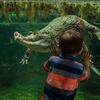A Critically Endangered pancake tortoise has been born at Longleat.
The tiny tortoise, which weighs just 17 grams and is only slightly larger than a 50 pence coin, is part of a captive breeding programme for the increasingly rare species at the Wiltshire safari park.
Baby pancake tortoises are actually born with domed shells, like other types of tortoise, and it is only as they mature their shells begin to flatten out.
First time mum Poppadom and dad Yua are both part of a coordinated European pancake tortoise studbook.
Native to Kenya and Tanzania, the pancake tortoise is the world’s fastest species of tortoise and is renowned for its speed and agility. Unlike other species of tortoise, their shells are flattened, extremely flexible and lightweight.
As they cannot use their shells for protection from would-be predators they have to rely on being flat, fast and flexible to evade capture.
The greatest threats facing the pancake tortoise are habitat destruction and the illegal pet trade. Due to their slow reproductive rates, wild populations take a long time to recover if their numbers fall.
In the wild they can live for up to 25 years while the maximum recorded age in captivity is 35 years.
A Critically Endangered (CR) species is one that has been categorised by the International Union for Conservation of Nature (IUCN) as facing an extremely high risk of extinction in the wild.
Related Members
-
News
 Amid rising costs, zoos are more relevant than ever… 3rd February, 2026It will come as no surprise to anyone working in the zoo sector that Britain and Ireland’s beloved zoos are facing challenges amidst a…
Amid rising costs, zoos are more relevant than ever… 3rd February, 2026It will come as no surprise to anyone working in the zoo sector that Britain and Ireland’s beloved zoos are facing challenges amidst a… -
News
.png?w=100&h=100&zc=1&f=jpeg&hash=aed4c6409e0441a61f3e1146ef560d83) Blog: Supporting Otter Conservation at Colchester Zoological Society 30th January, 2026Rebecca Moore (Zoological Director, Colchester Zoological Society) describes the charity's role in taking a global approach on the conservation…
Blog: Supporting Otter Conservation at Colchester Zoological Society 30th January, 2026Rebecca Moore (Zoological Director, Colchester Zoological Society) describes the charity's role in taking a global approach on the conservation… -
News
.png?w=100&h=100&zc=1&f=jpeg&hash=d2375a1baa7e4f03a56c766485cce667) Keepers Witness Birth of First Baby of 2026 at Safari Park 30th January, 2026A rare behind-the-scenes moment unfolded at West Midlands Safari Park as a giraffe gave birth to the Park’s first baby of 2026, with keepers there…
Keepers Witness Birth of First Baby of 2026 at Safari Park 30th January, 2026A rare behind-the-scenes moment unfolded at West Midlands Safari Park as a giraffe gave birth to the Park’s first baby of 2026, with keepers there…



